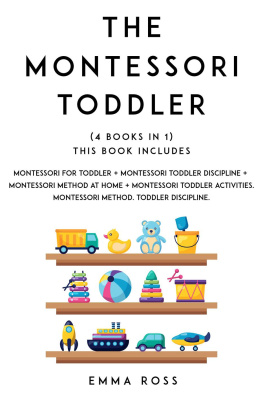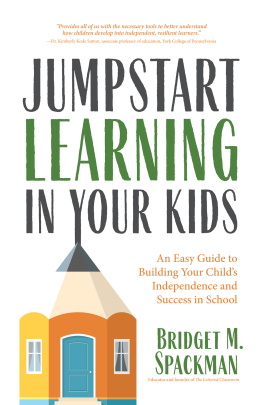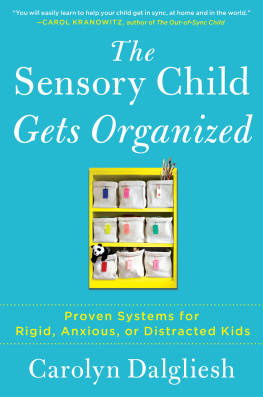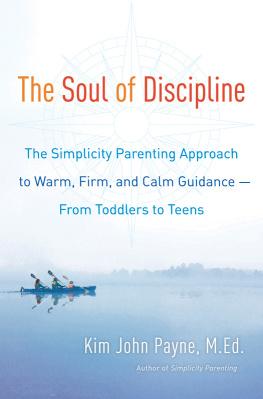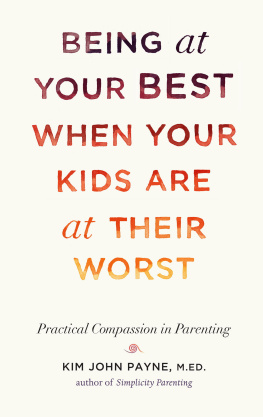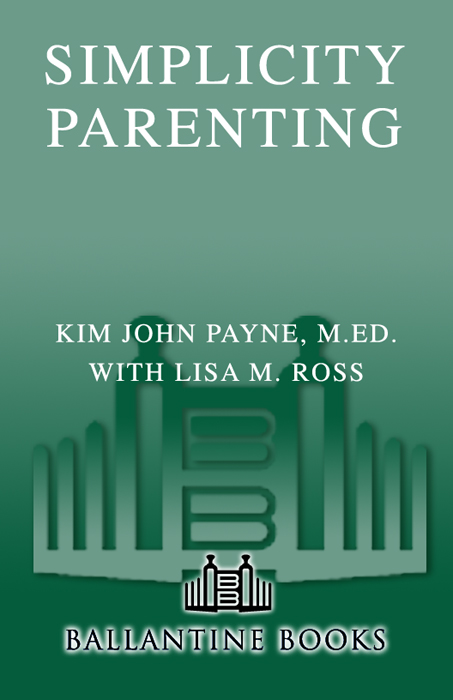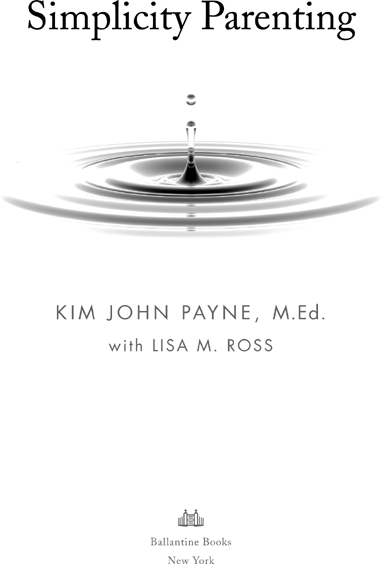Introduction
Go confidently in the direction of your dreams. As you simplify life the laws of the universe will be simpler.
HENRY DAVID THOREAU
A s parents, were the architects of our familys daily lives. We build a structure for those we love by what we choose to do together, and how we do it. We determine the rhythms of our days; set a pace. There are certainly limits to our control Ask any parent of a teenager. And it often feels that our lives are controlling us, caught as we are in a mad rush from one responsibility to another. Yet the unique way that we perform this dance of daily activities says a lot about who we are as a family.
You can see what a family holds dear from the pattern of their everyday lives. Ive been trained to do so as a counselor and educator, but children need no such fancy training. They pick up the clues naturally. They see the golden overlay on all of our comings and goings, all of our tasks and busyness. This is what they see: With our time and presence we give love. Simple.
And theyre quite right; as parents our motivations and intentions are few, our dreams nearly universal. No matter where, no matter how modestly or grandly we live, most of us want what is best for our loved ones. From these few common motivationslove, and the desire to protect and provide for our childrenwe build families. Every day.
As parents we carry the blueprints, the dreams of what our family could be. The plans change, the whole thing goes way over budget, there are unexpected additions, and the work never ends. Still, through the messiness of construction we see one another with such depth and hope. Our five-year-old boy is still so clearly the baby he once was and sometimescan you see it?the young man he will one day be. We draw energy and inspiration from our dreams; our simple, common motivations.
In their development, we can see the extent to which our children feel protected. Surrounded by those they love, they make extraordinary leaps, fantastic moments of revelation and mastery. At our urging or prodding? Never. In flashes they show us who they are revealing their golden, essential selves. And as parents we live for such moments. But we cant schedule them. We cant ask for, or hurry them.
We want our family to be a container of security and peace, where we can be our true selves. We want this most urgently for our children, who are engaged in the slow and tricky business of becoming themselves. Will our love and guidance give them the grace they need to grow? Children are so clearly happiest when they have the time and space to explore their worlds, at play. We may be bouncing between the future and the past, yet our childrenthe little Zen masterslong to stay suspended, fully engaged, in the moment. Our very best hope is that theyll develop their own voices, their own instincts and resiliency, at their own pace. And despite how many times we forgetsometimes in a single daywe absolutely know that this will take time.
The rest and rejuvenation we want from our homes is getting harder to find. Our work lives have moved in, taking residency in our computers, finding us wherever a phone or pager signal can reach. Children are overbooked as well. While parents may need software programs to keep track of their kids activities and schedules, developmental psychologist David Elkind notes that children have lost more than twelve hours of free time a week in the past two decades. When multitasking is valued as a survival skill, should we be surprised when increasing numbers of our children are being diagnosed with attention difficulties?
In every aspect of our lives, no matter how trivial, we are confronted with a dizzying array of things (stuff) and choices. The weighing of dozens of brands, features, claims, sizes, and prices, together with the memory scan we do for any warnings or concerns we may have heard; all of this enters into scores of daily decisions. Too much stuff and too many choices. If were overwhelmed as adults, imagine how our children feel! Whichever came firsttoo many choices or too much stuffthe end result of both is not happiness. Contrary to everything advertising tells us (but obvious to anyone who has chosen a cellular calling plan), too many choices can be overwhelming. Another form of stress. Not only can it eat away at our time, studies show that having lots of choices can erode our motivation and well-being.
Also finding its way into our homes, lives, and our childrens awareness is an avalanche of information, unfiltered and often unbidden. Home used to be a parochial outpost, and the outside world the big unknown. Parents had trouble conveying all of the information that their children might need to face life in the real world, beyond the confines of home and neighborhood. Today, the real world, in all of its graphic reality, is available for view anytime, any place, via the Internet. Our responsibility as gatekeepers is becoming exponentially more difficult even as its becoming more critical.
Youve heard about how a frog dropped into a pot of boiling water will struggle to get out? Nothing surprising there, but it turns out that if you put a frog in a pot of cold water, and slowly heat it to the boiling point, the frog will remain still, without any signs of struggle. Based on the families Ive been privileged to work with, the hundreds of parents whove shared with me their concerns, and my own experience as a parent, I believe that the pot were in today as families is increasingly inhospitable for us all but especially for our children.
Are we building our families on the four pillars of too much: too much stuff, too many choices, too much information, and too fast? I believe that we are. But I also believe that we dont mean to be. I know for a fact, and Ive seen it many times, that parents can bring fresh inspiration and attention to the flow of family life. Without a doubt, as the familys architects we can add a little more space and grace, a little less speed and clutter to our childrens daily lives.
My experience with many, many kids and families has helped me figure out ways to reduce the stresses, distractions, and choicesall forms of clutterin childrens lives. Ive seen how effective these strategies can be in restoring a childs sense of ease and well-being. This book is about realigning our daily lives with the pace and promise of childhood. Realigning our real lives with the dreams we hold for our families. Its goal is to help you strip away many of the unnecessary, distracting, and overwhelming elements that are scattering our childrens attention and burdening their spirits.
To have moments of calmcreative or restfulis a form of deep sustenance for human beings of all ages. Relationships are often built in these pauses, in the incidental moments, when nothing much is going on. This book should give you many ideas on how to reclaim such intervals, how to establish for your children islands of being in the torrent of constant doing.
If, as a society, we are embracing speed, it is partially because we are swimming in anxiety. Fed this concern and that worry, were running as fast as we can to avoid problems and sidestep danger. We address parenting with the same anxious gaze, rushing from this enrichment opportunity to that, sensing hidden germs and new hazards, all while doing our level best to provide our children with every advantage now known or soon to be invented. This book is not about hidden dangers, quick fixes, or limited-time opportunities; it is about the long haul. The big picture: a reverence for childhood.


